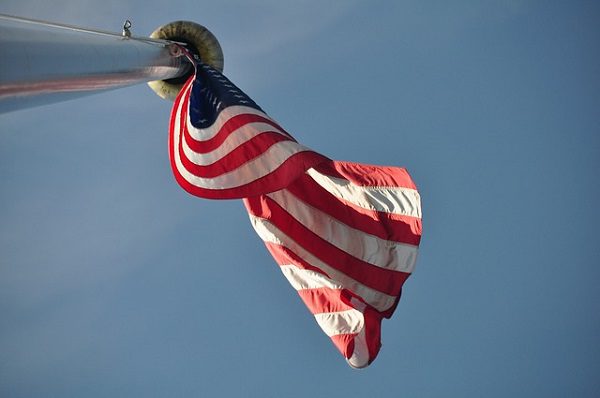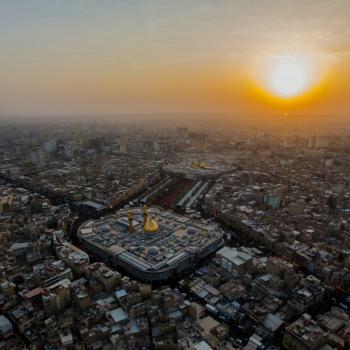This is Day 20 of the 2017 #30Days30Writers Ramadan series – June 15, 2017
By Rahat Husain
It’s a familiar story.
After the departure of a well-regarded leader, the community became split over the question of who his successor should be. Later, divisions arose questioning the legitimacy of the successor himself. Despite being one community, with one foundational text, differing interpretations of how to apply the text lead to even more strife.
This is not a description of the historic split between Sunni and Shia Muslims. Instead, it is a reference to the two sects that have emerged in America today and the discourse that has evolved. Two sects that oppose each other ideologically, socially and with visceral emotion: Republicans and Democrats.
Members of American political parties behave like followers of a religion in many ways. They often uncompromisingly adhere to a set of principles. Issues relating to these principles permeate nearly every aspect of life and are discussed in public forums and private gatherings at length. They have more in common with members of their political affiliation than with family members or members of their own religion, who do not share the same political ideology.
As Goes Ramadan, So Should Go the Nation
Ramadan, for most Muslims, is a time for the community to come together. There’s a strong emphasis on communal meals, prayers, and socializing for Muslims throughout the holy month. The same used to be true for American holidays, but the positive sentiment has taken a backseat to political arguments over how holidays are celebrated throughout the country, particularly regarding the bogeyman known as “political correctness.”
For Muslims today, celebrating a holiday together is a very public indication of unity. Or if celebrated apart, an embarrassing reminder of differences within the community. (This year, Sunnis and Shias in the U.S. began Ramadan together). As Muslims spend the month coming together, it is important to talk about the rift between Democrats and Republicans. And, as Muslims have learned from their mistakes in sectarianism, it is critical that America does not repeat the past.
A disturbing way that political parties behave like a religion is the contempt members of each side of the political spectrum feels towards the other side, despite being part of the same nation.
This outlook has other consequences too. Democrats took pains to issue a message of inclusiveness towards Muslims during the recent election, whereas the Republicans focused on the threat posed by “radical Islamic terrorists”. Since gaining power, the Republicans have cancelled typical community outreach events with the Muslim community.
The State Department, for example, announced that it would not be holding its annual Ramadan iftaar. President Trump, without comment, has not organized this year’s White House iftaar – a traditional event dating back to President Thomas Jefferson.
The split between Sunni and Shia has many parallels between the political parties in the United States. There are even other groups in each system, who play an important part in the fabric of Muslim communities, even though there are relatively less adherents.
Each group desires a better future for the entire community, and hopes that the “other” will come around to their way of thinking. Sadly, a key feature of sectarianism is the hatred of the other side, and it is very much present in American politics.
Why ‘New Sectarianism’ Is Pulling this Country Apart
The pitfalls of this new sectarianism are something many Muslims know about. Sectarianism has been the scourge of the Islamic community for ages, and it is steadily creeping into the American diaspora.
A common example of how this behavior is counterproductive is the desire to engage in “gotcha politics” against the other side by engaging in divisive rhetoric, exaggerating minor differences and using any opportunity to put down the other side. There were numerous instances of this during the 2016 presidential elections, and this conduct continues today.
Online arguments are a new way of opposing one another, but have many of the hallmarks of sectarianism. On a regular basis, many otherwise educated individuals get sucked into the daily “Leftist v Conservative” wars that are in every comment section of almost every new article, and they descend into emotionally charged arguments. It is common to see whole groups of people entirely dismissed outright simply because of their political affiliation.
Most Muslims will be able to recognize this as purely sectarian behavior.
There was a time, in American politics, where being a conservative or liberal was a matter of principled disagreement on how to conduct the affairs of the country. Now it has become a sense of identity rooted in the question of how to come out on top.
The future of the sectarianism between Democrats and Republicans can take lessons from the history of Islam and Muslims. Throughout centuries of dispute, Muslims have found that progress has rarely occurred through internal fighting in the same community. Some have not learned this lesson, as exemplified by the diplomatic crisis between Saudi Arabia and Qatar, which reached its peak on the 10th day of Ramadan this year, when the countries split ties over a variety of reasons, including Qatar’s support of regional Shiites.
American Muslims are Examples of a Way Forward
America serves as an interesting example of a way forward. Accurate numbers of Sunnis and Shias don’t exist in the U.S., but one thing is clear – the two sects get along in this country. Among the nation’s hundreds of scholars, mosques, national organizations and other groupings, mention of conflict between American members of Sunnism and Shiaism is virtually nonexistent.
Disputes and arguments do occur, but they don’t reach a level of community antipathy towards the other sect. For example, it is relatively common to see Shia speakers at ISNA, one of the largest Muslim conventions in the U.S., (where most attendees are Sunni), and Sunni speakers at UMAA, one of the largest Shia conventions in the U.S. Both types of speakers often get standing ovations.
Among the more than six million Muslims in the country, there are no reports of violence, lawsuits or any type of rivalry between the two sects. Many Sunni and Shia communities have been in the U.S. for more than thirty years, underscoring this point. These types of fights don’t often exist amongst political parties, but as the rivalry intensifies, there are signs emerging that the political system is heading down a dark path.
In the U.S., amongst Sunnis and Shias, each community is well blended with the other. Dinner parties, religious celebrations, funerals, family events are commonly shared by Sunnis and Shiites. At the same time, neither sect loses its sense of religious identity. Principled debates on belief and the future are common, but it is without the vitriol that is tainting our current political discourse.
The Quran says, “Hold fast together […] and be not divided amongst yourselves” (3:103).
Republicans and Democrats need to find a way forward, just as the Sunnis and Shias in America have done. There is a way forward, to build America society in the way that everyone wants, but it cannot be done when the country is tearing itself apart.
Rahat Husain is an attorney and writer based in Washington, D.C. He is the Director of Legal and Policy Affairs at UMAA Advocacy. For the past six years, he has worked with Congressmen, Senators, federal agencies, think tanks, NGOs, policy institutes, and academic experts to advocate on behalf of Shia Muslim issues, both political and humanitarian. UMAA hosts one of the largest gatherings of Shia Ithna Asheri Muslims in North America at its annual convention.















